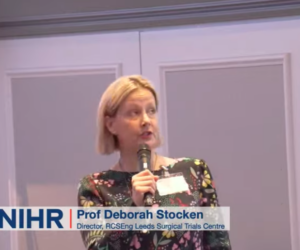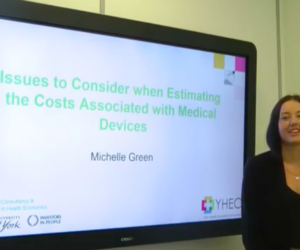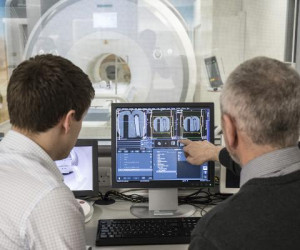Theme Leads: Professor Deborah Stocken and Professor David Meads
Background
Innovators working in the HealthTech space, face knowledge barriers relating to the regulatory and evidentiary requirements of decision makers. They may not have access to relevant expertise to help characterise the value of their technology, nor the resources required to generate the evidence to build a value proposition.
Large, randomised trials in this setting – where innovations evolve quickly and there are many competing technologies – can be inappropriate, requiring alternative data sources and analytical approaches. Furthermore, the pathway to market is unclear and funders are faced with substantial risk in adopting technologies.
We have extensive experience in securing funding to apply early economic modelling across diagnostics, surgical devices, and digital and AI technologies. Early economic modelling allows identification of drivers of value and estimation of break-even thresholds such as maximum viable cost (headroom analysis) and minimum performance/efficacy parameters required to achieve savings/cost-effectiveness. Early modelling can inform pricing strategies, help identify the target population and inform product development, for example via target product profiles.
The pathway of evidence generation requires formal early assessment of technology efficacy. Our experience in the development and delivery of early phase platform studies, adopting umbrella protocols and a network meta-analysis approach can streamline prospective assessment of technologies efficiently utilising non-concurrent, shared control patients and matching techniques. Our experience in early phase statistical methodologies, combined with exploration of the role of statistical simulation, will support decision making in innovation.
Our generic discrete event simulation model (SimSurg I), models the flow of patients through diagnostic, admission, procedure and discharge processes. The model captures resources (staff and facilities), queue times and costs/outcomes at a system level. We will showcase the model via our portal and at workshops with SMEs and invite applications to adapt the model to evaluate their technology.
Areas of Focus
Strategic planning of evidence generation and competitive funding bids, providing research methods, health economics, statistical and mixed methods advice and expertise in study design and analysing real-world data.
Work closely with our Surgical Care Observatory to undertake gap analyses and use expert elicitation to prioritize promising technologies.
Use expertise in early economic and budget impact modelling to establish the potential financial impact and value for money of these technologies.
Services offered:
Early Economic Evaluation
Early economic evaluation is a preliminary analysis conducted during the early stages of a health technology’s development to estimate its potential cost-effectiveness and value compared to existing alternatives. Usually early economic evaluations employ a decision modelling framework, bringing together existing evidence on the new technology with data from the literature, available databases and (where necessary) expert opinion. Modelled outcomes typically include patient health outcomes, costs, and benefits, helping to guide future research and development decisions.
Why do this?
The main benefits of early economic evaluation include identifying whether a technology is likely to be economically viable, informing design and investment decisions, prioritising data collection, and reducing the risk of late-stage failure. By doing this early, developers can align their product with payer and health system expectations, ultimately increasing the chances of successful adoption and reimbursement.
Scope of work
An early economic evaluation typically involves the following components of work:
- Development of the clinical care pathway, based on a review of available clinical guidelines and consultation with clinical experts and patients where possible
- A rapid targeted literature search, to help identify evidence to populate the model
- Model development and analysis
- Sensitivity analyses to identify key uncertain parameters in the model, maximum price thresholds, and minimum performance thresholds
Main outputs
– Economic evaluation report
– Economic model files and documentation
Economic Evaluation
Economic evaluation is a structured analysis conducted to assess the cost-effectiveness and overall value of a health technology compared to existing alternatives. Typically, it employs a decision modelling framework that synthesises robust clinical and economic evidence from the literature, databases, and expert input. Modelled outcomes include patient health outcomes, costs, and benefits, to support decisions around technology adoption, reimbursement, and resource allocation.
Why do this?
The main benefits of economic evaluation include determining whether a technology offers good value for money, supporting pricing and reimbursement decisions, and informing policy and clinical guidelines. By conducting a thorough evaluation, developers and decision-makers can ensure that new technologies align with payer expectations, address population needs and contribute to efficient healthcare spending.
Scope of work
An economic evaluation typically involves the following components of work:
- Development of the clinical care pathway, based on a review of clinical guidelines and consultation with clinical experts and patients where possible
- A systematic literature review to identify high-quality evidence for model inputs
- Model development and analysis, potentially using complex or individual-level modelling approaches
- Extensive sensitivity and scenario analyses, to assess uncertainty around the cost-effectiveness results
- A comprehensive economic evaluation report
- Additional elements, such as equity-informative analysis (e.g. distributional cost-effectiveness analysis (DCEA)), or assessment of technology carbon impacts, may be incorporated where appropriate (at additional cost).
Main Outputs
– Economic evaluation report
– Economic model files and documentation
Individual-level data analysis
What is it?
Where appropriate, economic evaluation may be supported by individual-level data analysis, using either clinical trial data or observational study data. This involves statistical analysis of patient-level data to estimate treatment effects, resource use, and health outcomes, which can then inform model inputs or be used for standalone analyses. Such analyses can improve the accuracy and relevance of economic models by capturing heterogeneity in patient characteristics, treatment pathways, and outcomes.
Why do this?
The main benefits of individual-level data analysis include generating more precise and context-specific estimates for use in economic models, identifying subgroups that may benefit differently from an intervention, and improving the robustness of cost-effectiveness estimates. It also allows for exploration of real-world effectiveness, treatment patterns, and equity considerations, which are increasingly important in health technology assessment and reimbursement decisions.
Scope of work
Typical activities may include:
- Cleaning and preparation of individual-level datasets provided
- Descriptive and inferential statistical analysis
- Estimation of treatment effects, transition probabilities, or utility values
- Subgroup and heterogeneity analysis
- Integration of results into economic models or reporting as standalone findings
Main outputs
– Data analysis/ economic evaluation report
– Data analysis files and documentation
Discrete Choice Experiment (DCE)
Discrete Choice Experiments (DCEs) are a quantitative research method used to elicit individual preferences by asking participants to choose between hypothetical alternatives, each described by a set of attributes with varying levels. In health economics, DCEs are commonly used to understand how patients, clinicians, or the public value different aspects of healthcare interventions, services, or outcomes. The results can be used to estimate demand/predict uptake, inform model parameters, or support decision-making around service design and policy.
Why do this?
The main benefits of conducting a DCE include gaining insights into stakeholder preferences, quantifying trade-offs people are willing to make between different features of a health technology, and estimating the relative importance of different attributes. This makes them a valuable tool for informing value-based pricing, benefit-risk assessments, and patient-centred care design.
Scope of work
A DCE typically involves the following components of work:
- Identification of relevant attributes and levels through literature review and stakeholder engagement
- Experimental design of choice sets using statistical design principles
- Development and piloting of the survey instrument
- Data collection from a representative sample of the target population
- Statistical analysis using models such as conditional logic or mixed logic
- Interpretation of results and integration into economic models or policy recommendations
Main outputs
– DCE report
Projects
SIGMA-S Statistical Innovation and Guidance on Methods and Analysis in Surgery
Research partnership on improving surgical outcomes: peri-operative care of patients with cirrhosis
£2.7 million study to improve gallstone treatment launched at Leeds
Coming soon…..
Coming soon…..
Coming soon…..
Coming soon…..
Coming soon…..



